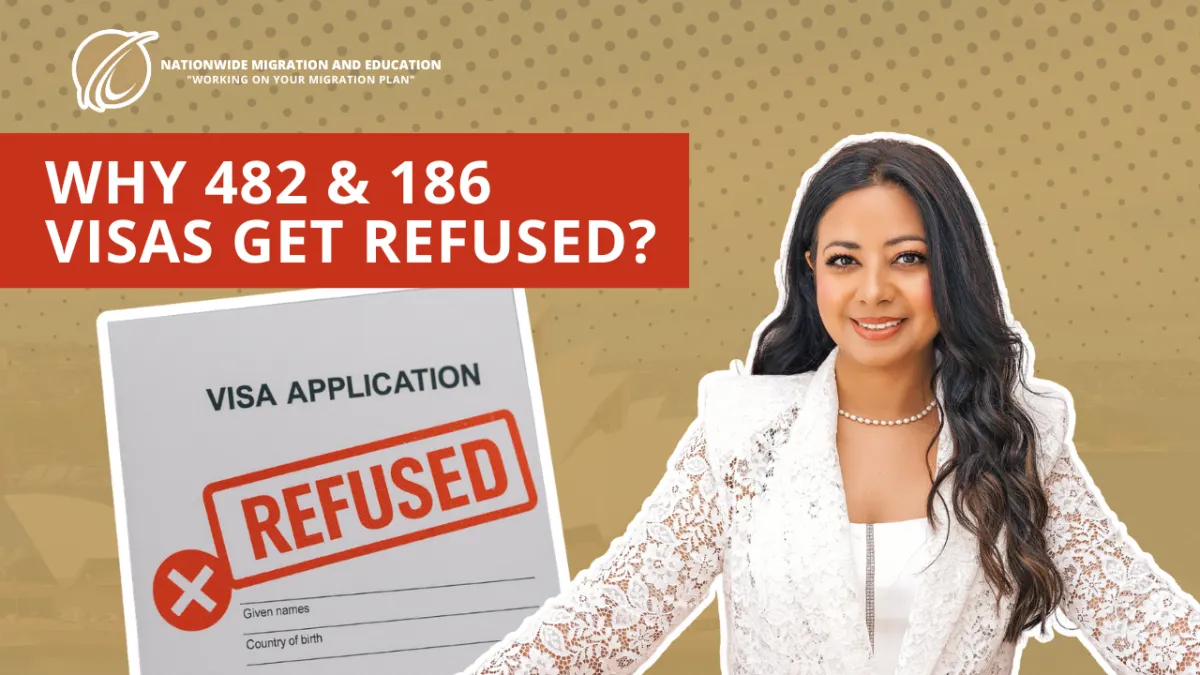
Common Reasons Why 482 and 186 Visas Get Refused
Have you ever wondered why so many 482 or 186 employer-sponsored visa applications get refused — even when the applicant is qualified and the employer is genuine?
Well, the truth is… it often comes down to five simple but costly mistakes that could’ve easily been avoided.
And in this blog, I’m going to break them down — so you know exactly what to avoid and how to give your visa application the best chance of success.
NOT MEETING THE AUSTRALIAN MARKET SALARY RATE (AMSR)
Let’s start with the number one issue — not meeting the Australian Market Salary Rate, or AMSR.
This is one of the most common reasons for refusal, especially with the 482 visa.
When a business sponsors a worker, they must pay at least what an Australian citizen or permanent resident would earn for the same role, in the same location, and with the same level of experience.
This is not just about meeting the minimum salary threshold, or TSMIT.
If the real market rate for that role is $85,000, then that’s the amount the employer must offer — even if the applicant agrees to less.
Refusals happen when:
The salary is too low,
There’s no evidence to show how the AMSR was calculated, or
The business can’t prove that other Australians in similar roles are being paid that rate.
The Department usually expects things like job ads, industry awards, payslips, or enterprise agreements as evidence. Without these, the application is very likely to be refused.
POSITION IS NOT GENUINE
The next reason is when the Department finds that the position itself is not genuine.
This means they believe the job was created just to support a visa application — not because the business genuinely needs someone in that role.
You’ll often see this in small businesses with:
Very few staff,
Low turnover, or
Job titles that don’t align with their core business activity.
For example, if a small takeaway shop suddenly wants to sponsor a full-time “Marketing Manager” on a high salary, the Department might question whether this role is truly needed — especially if there’s no marketing budget or strategy in place.
This is why it’s essential to include:
A clear position description,
An organisational chart, and
Financial or operational documents to prove the business need for the role.
INADEQUATE LABOUR MARKET TESTING (LMT)
The third reason for refusal is Labour Market Testing not being done properly.
If LMT is required, the employer must show they advertised the job for at least 28 consecutive days on approved platforms, such as Seek, JobActive, or Indeed.
The ad must include:
The job title,
Duties and qualifications required, and
The salary or salary range.
Refusals happen when:
The ad wasn’t live for long enough,
The salary wasn’t included, or
The wrong platforms were used.
Our team at Nationwide Migration and Education helps employers draft compliant job ads and keeps track of the timing and evidence — because a small LMT error can cost you the whole nomination.
APPLICANT DOES NOT MEET THE REQUIRED SKILLS OR EXPERIENCE
Another common reason is that the applicant doesn’t meet the experience or qualifications required for the nominated occupation.
For a 482 visa, you need at least1 year of full-time, work experience in the nominated role. That experience must also align with the ANZSCO definition of the occupation.
Applications can be refused if:
Experience is not clearly documented,
Duties don’t match the nominated ANZSCO code, or
Reference letters lack detail or don’t cover the correct time period.
We guide both applicants and employers on how to present clear, verifiable experience, so the Department has no doubts.
INCOMPLETE OR POOR DOCUMENTATION FROM THE EMPLOYER
And finally — one that surprises a lot of people — many applications are refused simply due to incomplete or poorly prepared documentation from the employer.
This includes things like:
Missing BAS statements,
Unclear or missing organisational charts,
Poorly written or copied position descriptions, and
Lack of evidence showing the business can financially support the role.
Remember, even if your business is genuine, the Department still needs proper evidence to make a decision. If they don’t get it, they will refuse the application.
At Nationwide Migration and Education, we do a full document check before anything is lodged — because once it's submitted, you usually don’t get a second chance to explain.
Final Thoughts
So there you have it — the five most common reasons why employer-sponsored visas like the 482 and 186 get refused.
If you're an employer, make sure your role is genuine, your salary aligns with market rates, and all your documents are in order. And if you’re a skilled worker, ensure your experience matches the occupation exactly and is well-documented.
At Nationwide Migration and Education, our team of registered agents and visa specialists work closely with both employers and skilled migrants to prepare decision-ready applications that meet all legal and practical requirements.
If you need help with your application — or you’ve had a refusal and want to avoid making the same mistake again — get in touch with us. We’d love to help you.
Disclaimer:
The information shared by Nationwide Migration and Education is for general informational purposes only. While accurate at the time of publication, details may change. This content is not intended as legal or migration advice. For advice tailored to your circumstances, please book a consultation with us!